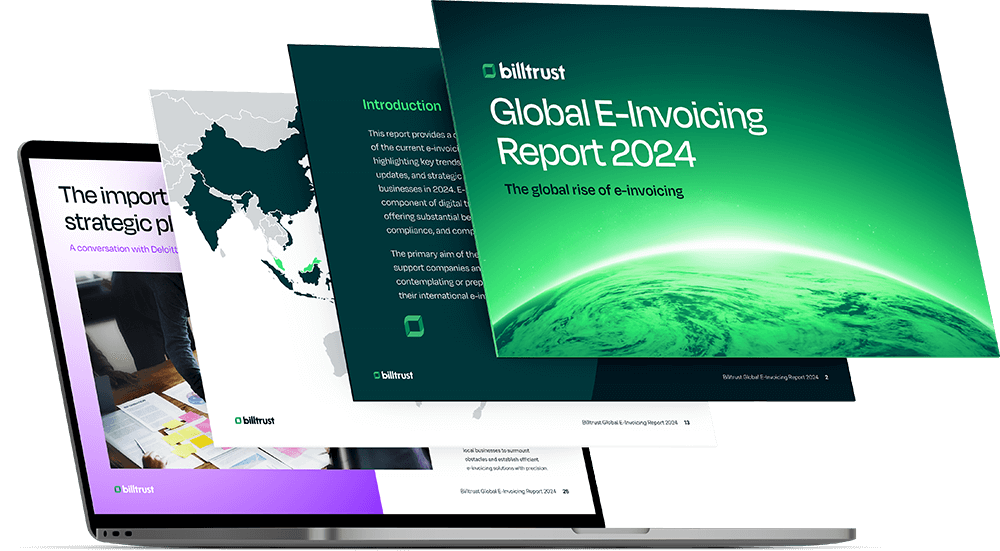Governments worldwide continue to push forward with new mandates, regulations, and policy reforms, making it essential for businesses to stay updated and informed.
This quarterly overview brings you the latest updates on e-invoicing and e-reporting developments. We begin with significant evolutions in the EU's ViDA package, highlighting key changes you need to know.
EU: VAT package adopted
On March 11, 2025, the Council of the European Union formally adopted the VAT in the Digital Age (ViDA) package, marking the final step in the approval process. This comprehensive reform aims to modernize the EU's VAT system to better align with the digital economy and prevent tax fraud through mandatory e-invoicing and digital reporting requirements.
The three pillars of ViDA
- The first and most extensive pillar focuses on mandatory EU e-invoicing and digital reporting for VAT.
- The second pillar addresses the platform economy, particularly regarding short-term accommodation rentals and passenger transport services, enhancing the role of digital platforms in VAT collection.
- The third pillar proposes a single VAT registration system, enabling businesses to manage their tax obligations throughout the EU with one registration.
E-invoicing and Digital Reporting implementation timeline
Here is a summary of the three phases of the EU's ViDA implementation, along with key dates:
Phase 1: Early changes (expected mid-April 2025)
- Member States can mandate e-invoicing for domestic supplies without prior EU Council approval.
- Customers must accept e-invoices if required by Member States from that date.
- Gradual adoption encouraged to support small and medium enterprises.
Phase 2: Cross-border standardization (July 1, 2030)
- VAT-registered businesses will be obliged to issue structured e-invoices for cross-border B2B and B2G supplies within the EU.
- E-invoices must be based on a standard EU format (though Member States may allow other formats under certain conditions).
- E-invoices must be issued within 10 days of the supply date (or payment date, if earlier).
- Suppliers must digitally report invoice data to tax authorities immediately after issuance (or within 5 days for self-billing).
- Customers must also report data within 5 days of receipt, unless Member States waive it.
- Monthly summary invoices are now allowed under specific conditions.
Phase 3: Full harmonization (January 1, 2035)
- Full harmonization of e-invoicing and digital reporting across all EU Member States, including domestic transactions.
- Member States with pre-2024 domestic e-reporting systems must align with EU standards.
Belgium: e-reporting in 2028
Belgium will introduce e-reporting in 2028, following mandatory e-invoicing in 2026. Near real-time reporting will apply to VAT taxpayer transactions and those using registered cash registers. This system will connect cash registers, payment, and invoicing systems to the administration, automatically transmitting VAT data.
Benefits include reduced administrative VAT obligations, such as eliminating client listings, and minimizing VAT fraud through improved data analysis and monitoring.
There’s also confirmation that non-established entities with a Belgian VAT number will be excluded from the scope of the e-invoicing mandate, including issuing and receiving structured e-invoices. However, this exemption may be revisited when e-reporting obligations come into effect in 2028.
E-invoicing in Belgium: the complete guide for 2026

Bolivia: deadline extension for certain taxpayers
Bolivia has extended the e-invoicing deadline for taxpayer groups 10 and 11 by one month, moving it from February 1, 2025, to March 1, 2025. This adjustment impacts 7,586 taxpayers, giving them additional time to transition to issuing digital tax documents through the online billing system.
Botswana: e-invoicing initiative
On February 10, the Minister of Finance introduced the proposed national budget for the 2025/2026 fiscal year. Among its key initiatives is the rollout of e-invoicing, aimed at streamlining VAT collection. This system is expected to be fully implemented by March 2026.
Croatia: e-invoicing and e-reporting in 2026
The Ministry of Finance has announced a public consultation on the upcoming implementation of mandatory B2B e-invoicing and e-reporting, set to take effect on January 1, 2026. This initiative is a key component of Fiskalizaciju 2.0 and includes the introduction of a new reporting platform, FiskApplication, along with a free e-invoicing tool called MICROeINVOICE.
Discover the latest global trends in e-invoicing

Greece: derogation accepted by EU
The EU Council has officially approved Greece’s mandatory B2B e-invoicing initiative, set to take effect from July 1, 2025, through December 31, 2027.
In July 2024, Greece requested a derogation from Directive 2006/112/EC to introduce e-invoicing for domestic B2B transactions between taxable entities. This mandate will not impact foreign businesses or business-to-customer (B2C) transactions.
Under the new rules, mandatory e-invoicing will be implemented between July 1, 2025, and June 30, 2026. The system will require real-time transaction reporting to Greece’s myDATA platform, ensuring compliance with European standards.
Jordan: phase 2 in progress
Jordan is moving forward with phase 2 of its e-invoicing initiative, which will officially launch on April 1, 2025. This phase will require businesses to integrate with the national billing system, marking a significant step in the country’s digital transformation efforts.
The e-invoicing journey for Jordan began in 2022, with registration for the JoFotara system concluding on May 31, 2024.
Key points include:
- All invoices must be issued via the national electronic billing system or a platform connected to it.
- Issuing and providing the original tax invoice is compulsory.
This milestone underscores Jordan's commitment to modernizing its tax infrastructure and enhancing transparency in business operations.
Malaysia: last phase delayed till 2026
New e-invoicing guidelines (Version 4.1) were published on January 28, 2025, alongside a structured roadmap for phased implementation. The government has also postponed the implementation of e-invoicing for MSMEs (businesses with annual sales of up to 500,000 RM) to January 1, 2026, granting more time for preparation. To summarize, Malaysia is introducing e-invoicing in four key phases, taking into account the turnover or revenue thresholds.
Poland: Only minor changes for KSeF
The final consultations on the National e-Invoice System (KSeF) concluded in November 2024, with the draft VAT Act amendment still under government review. While minor changes are possible, significant revisions are unlikely. The legislative process is expected to finalize by Q1 2025, according to the Ministry of Finance.
Slovakia: public consultation
A public consultation started in January 2025 for mandatory B2B e-invoicing and e-reporting by January 1, 2027. Slovakia will use Peppol for both domestic and intra-community transactions, reducing reliance on the IS EFA centralized platform.
Slovenia: B2B e-invoicing from 2027
Slovenia has announced plans to mandate e-invoice reporting for B2B transactions starting January 1, 2027, postponing the original implementation date of June 1, 2026, by seven months. The proposal removes the requirement for real-time reporting to the Financial Administration (FURS). Additionally, B2B invoices involving non-resident entities will need to comply with the new reporting standards.
Taxpayers have three options to streamline e-invoicing: direct e-invoice exchange, certified e-invoicing service providers, or the Peppol network. Accepted formats include the national e-SLOG standard, any format aligned with the European standard EN 16931, or other internationally recognized formats, provided both sender and receiver mutually agree.
UAE: e-invoicing and e-reporting in July 2026
The country is transitioning to a 5-corner Peppol model, adopting Peppol PINT as the standard format. Mandatory e-invoicing and reporting will take effect in July 2026, with an option for early voluntary adoption.
In February 2025, the Ministry of Finance (MoF) released a public consultation paper on e-invoicing, which includes a proposed E-Invoicing Data Dictionary. This dictionary establishes a standardized framework for invoice data elements.
UK: public consultation launched
The UK has launched a public consultation on e-invoicing, open until May 7, 2025, to explore its standardization and potential adoption. This initiative focuses on both business-to-government (B2G) and business-to-business (B2B) transactions, aiming to enhance efficiency and interoperability. Key areas under review include:
- Standardization: Gathering feedback on how to create a unified e-invoicing system across the UK to improve compatibility and streamline processes.
- Digital models: Evaluating various invoicing models and their ability to seamlessly integrate with existing business systems.
- Real-time reporting: Considering whether e-invoicing should be paired with real-time digital reporting to enhance error detection and simplify VAT return filings.
This consultation marks a significant step toward modernizing the UK’s invoicing landscape.
Billtrust is here to help
The transition to mandatory B2B e-invoicing around the world is a significant shift that requires careful preparation. While e-invoicing has many benefits for businesses, there are challenges ahead. Billtrust is here to support you on this journey, making you compliant and your order-to-cash process more efficient. Contact us today.


